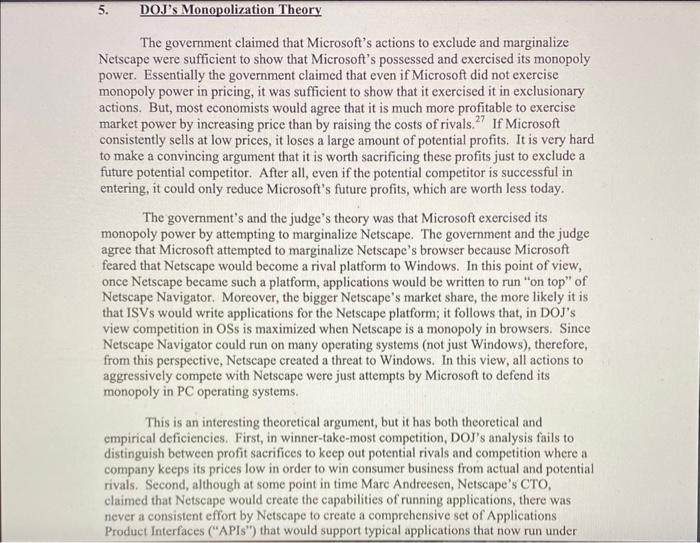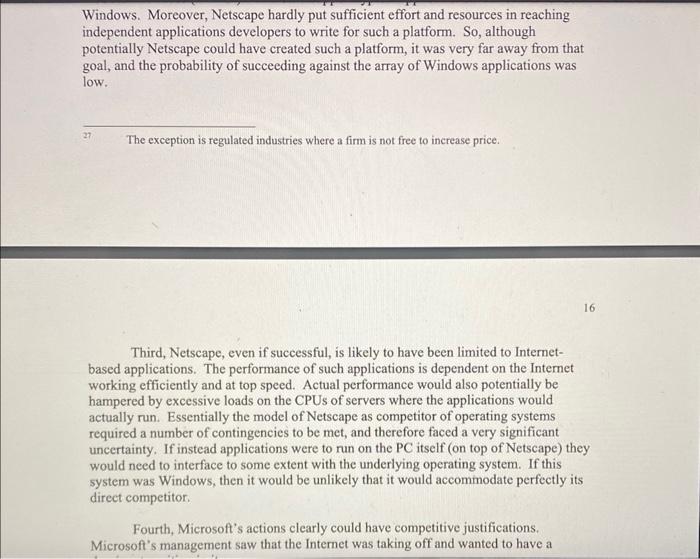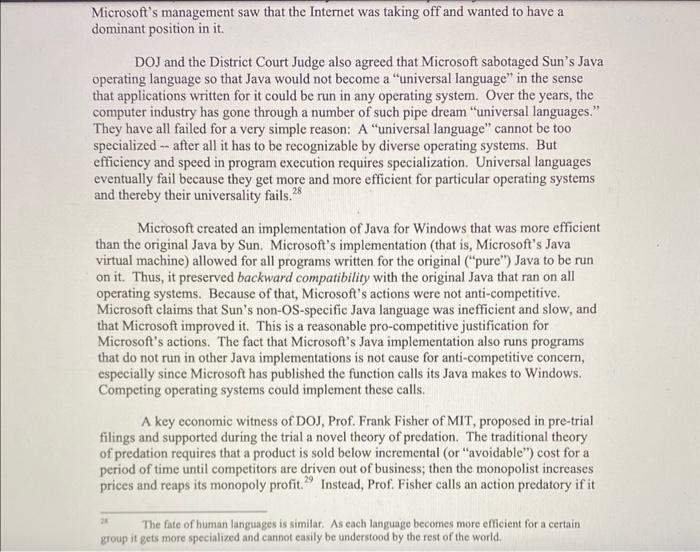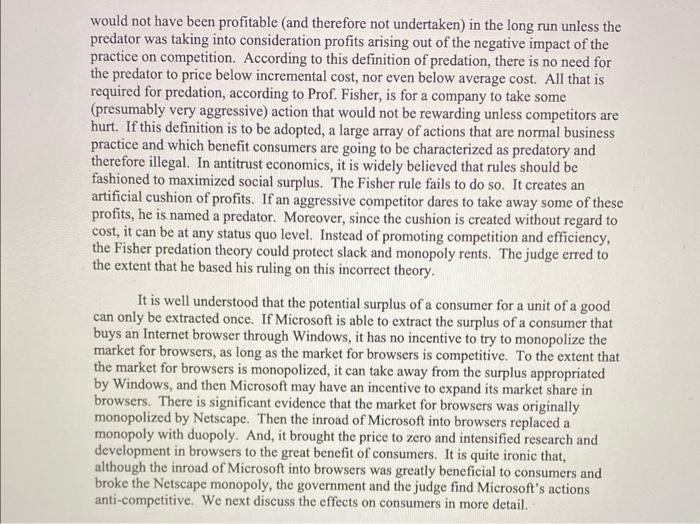Microsoft Case Study: Nicholas Economides "The Microsoft Antitrust Case" B This case study discusses briefly the economic and legal issues pertaining to the antitrust case of the United States and a number of States against Microsoft. Please answer question 4 on page 24. Do you agree with the government's theory on monopolization in section 5 ? Why or why not? The government claimed that Microsoft's actions to exclude and marginalize Netscape were sufficient to show that Microsoft's possessed and exercised its monopoly power. Essentially the government claimed that even if Microsoft did not exercise monopoly power in pricing, it was sufficient to show that it exercised it in exclusionary actions. But, most economists would agree that it is much more profitable to exercise market power by increasing price than by raising the costs of rivals. 27 If Microsoft consistently sells at low prices, it loses a large amount of potential profits. It is very hard to make a convincing argument that it is worth sacrificing these profits just to exclude a future potential competitor. After all, even if the potential competitor is successful in entering, it could only reduce Microsoft's future profits, which are worth less today. The government's and the judge's theory was that Microsoft exercised its monopoly power by attempting to marginalize Netscape. The government and the judge agree that Microsoft attempted to marginalize Netscape's browser because Microsoft feared that Netscape would become a rival platform to Windows. In this point of view, once Netscape became such a platform, applications would be written to run "on top" of Netscape Navigator. Moreover, the bigger Netscape's market share, the more likely it is that ISVs would write applications for the Netscape platform; it follows that, in DOJ's view competition in OSs is maximized when Netscape is a monopoly in browsers. Since Netscape Navigator could run on many operating systems (not just Windows), therefore, from this perspective, Netscape created a threat to Windows. In this view, all actions to aggressively compete with Netscape were just attempts by Microsoft to defend its monopoly in PC operating systems. This is an interesting theoretical argument, but it has both theoretical and empirical deficiencies. First, in winner-take-most competition, DOJ's analysis fails to distinguish between profit sacrifices to keep out potential rivals and competition where a company keeps its prices low in order to win consumer business from actual and potential rivals. Second, although at some point in time Marc Andreesen, Netscape's CTO, claimed that Netscape would create the capabilities of running applications, there was never a consistent effort by Netscape to create a comprehensive set of Applications Product Interfaces ("APIs") that would support typical applications that now run under Windows. Moreover, Netscape hardly put sufficient effort and resources in reaching independent applications developers to write for such a platform. So, although potentially Netscape could have created such a platform, it was very far away from that goal, and the probability of succeeding against the array of Windows applications was low. The exception is regulated industries where a firm is not free to increase price. Third, Netscape, even if successful, is likely to have been limited to Internetbased applications. The performance of such applications is dependent on the Internet working efficiently and at top speed. Actual performance would also potentially be hampered by excessive loads on the CPUs of servers where the applications would actually run. Essentially the model of Netscape as competitor of operating systems required a number of contingencies to be met, and therefore faced a very significant uncertainty. If instead applications were to run on the PC itself (on top of Netscape) they would need to interface to some extent with the underlying operating system. If this system was Windows, then it would be unlikely that it would accommodate perfectly its direct competitor. Fourth, Microsoft's actions clearly could have competitive justifications. Microsoft's management saw that the Internet was taking off and wanted to have a Microsoft's management saw that the Internet was taking off and wanted to have a dominant position in it. DOJ and the District Court Judge also agreed that Microsoft sabotaged Sun's Java operating language so that Java would not become a "universal language" in the sense that applications written for it could be run in any operating system. Over the years, the computer industry has gone through a number of such pipe dream "universal languages." They have all failed for a very simple reason: A "universal language" cannot be too specialized - after all it has to be recognizable by diverse operating systems. But efficiency and speed in program execution requires specialization. Universal languages eventually fail because they get more and more efficient for particular operating systems and thereby their universality fails. 28 Microsoft created an implementation of Java for Windows that was more efficient than the original Java by Sun. Microsoft's implementation (that is, Microsoft's Java virtual machine) allowed for all programs written for the original ("pure") Java to be run on it. Thus, it preserved backward compatibility with the original Java that ran on all operating systems. Because of that, Microsoft's actions were not anti-competitive. Microsoft claims that Sun's non-OS-specific Java language was inefficient and slow, and that Microsoft improved it. This is a reasonable pro-competitive justification for Microsoft's actions. The fact that Microsoft's Java implementation also runs programs that do not run in other Java implementations is not cause for anti-competitive concern, especially since Microsoft has published the function calls its Java makes to Windows. Competing operating systems could implement these calls. A key economic witness of DOJ, Prof. Frank Fisher of MIT, proposed in pre-trial filings and supported during the trial a novel theory of predation. The traditional theory of predation requires that a product is sold below incremental (or "avoidable") cost for a period of time until competitors are driven out of business; then the monopolist increases prices and reaps its monopoly profit. 29 Instead, Prof. Fisher calls an action predatory if it The fate of human languages is similar. As each language becomes more efficient for a certain group it gets more specialized and carnot easily be understood by the rest of the world. would not have been profitable (and therefore not undertaken) in the long run unless the predator was taking into consideration profits arising out of the negative impact of the practice on competition. According to this definition of predation, there is no need for the predator to price below incremental cost, nor even below average cost. All that is required for predation, according to Prof. Fisher, is for a company to take some (presumably very aggressive) action that would not be rewarding unless competitors are hurt. If this definition is to be adopted, a large array of actions that are normal business practice and which benefit consumers are going to be characterized as predatory and therefore illegal. In antitrust economics, it is widely believed that rules should be fashioned to maximized social surplus. The Fisher rule fails to do so. It creates an artificial cushion of profits. If an aggressive competitor dares to take away some of these profits, he is named a predator. Moreover, since the cushion is created without regard to cost, it can be at any status quo level. Instead of promoting competition and efficiency, the Fisher predation theory could protect slack and monopoly rents. The judge erred to the extent that he based his ruling on this incorrect theory. It is well understood that the potential surplus of a consumer for a unit of a good can only be extracted once. If Microsoft is able to extract the surplus of a consumer that buys an Internet browser through Windows, it has no incentive to try to monopolize the market for browsers, as long as the market for browsers is competitive. To the extent that the market for browsers is monopolized, it can take away from the surplus appropriated by Windows, and then Microsoft may have an incentive to expand its market share in browsers. There is significant evidence that the market for browsers was originally monopolized by Netscape. Then the inroad of Microsoft into browsers replaced a monopoly with duopoly. And, it brought the price to zero and intensified research and development in browsers to the great benefit of consumers. It is quite ironic that, although the inroad of Microsoft into browsers was greatly beneficial to consumers and broke the Netscape monopoly, the government and the judge find Microsoft's actions anti-competitive. We next discuss the effects on consumers in more detail











